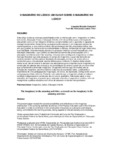| dc.contributor.advisor | Leães Filho, Wenceslau Virgilio Cardoso | |
| dc.creator | Venturini, Lisandra Brizolla | |
| dc.date.accessioned | 2019-08-29T14:27:31Z | |
| dc.date.available | 2019-08-29T14:27:31Z | |
| dc.date.issued | 2008-08-26 | |
| dc.date.submitted | 2008 | |
| dc.identifier.uri | http://repositorio.ufsm.br/handle/1/18072 | |
| dc.description | Artigo (especialização) - Universidade Federal de Santa Maria, Centro de Educação Física e Desportos, Curso de Especialização em Educação Física Escolar, RS, 2008. | por |
| dc.description.abstract | The present paper reveals the several possibilities and reflections on the imaginary
interlocution in the amusing activities as well as in the Physical Education and in the Children
Education in order to contribute in the construction of learners as a dynamic and integral
being, committed to the learning process, being capable to interact socially and universally. Thus, the young students will have access to a positive school imaginary, to an amusing
living, not only by having a funny practice, but by registering in their both childhood and
school memories situations lived in such amusing activities. Therefore, the transformation in
the school is a historic-cultural process marked by a classicist education, which justifies the
fact that the discoveries based on the worries about education in the childhood are too
recent, including under the scope of the imaginary and amusing. That means to affirm that
this research on the subject of imaginary, despite of being recent, it contributes for the
freedom of education in favor of the active and constructive teaching for an effective children
education at school. The objective of the present research is to draw educators’ attention on
the importance of the imaginary in the construction of children’s knowledge and in the
consolidation of the teaching from a new glance which comprehends the imaginary
dimension. Thus, the theoretical background are the imaginary findings, the historic-cultural
line and the amusing expression, in which is justified the importance of a pedagogy approach
based on imagination, amusement, expression composing a critical-reflective research.
Likewise, it is important to reinforce the imaginary allied to amusing is a indispensable
condition to construct a quality teaching. Knowing the educative value of the imaginary is not
enough, it is necessary the educator exercises the educative value of the imaginary in order
to redo the meaning of the educative practice with the lens of an educator and not merely of a
teacher. | eng |
| dc.language | por | por |
| dc.publisher | Universidade Federal de Santa Maria | por |
| dc.rights | Acesso Aberto | por |
| dc.rights | Attribution-NonCommercial-NoDerivatives 4.0 International | * |
| dc.rights.uri | http://creativecommons.org/licenses/by-nc-nd/4.0/ | * |
| dc.subject | Imaginário | por |
| dc.subject | Lúdico | por |
| dc.subject | Educação infantil | por |
| dc.subject | Imaginary | eng |
| dc.subject | Amusing | eng |
| dc.subject | Children education | eng |
| dc.title | O imaginário no lúdico: um olhar sobre o imaginário no lúdico | por |
| dc.title.alternative | The imaginary in the amusing activities: a remark on the imaginary in the amusing activities | eng |
| dc.type | Trabalho de Conclusão de Curso de Especialização | por |
| dc.degree.local | Santa Maria, RS, Brasil | por |
| dc.degree.specialization | Educação Física Escolar | por |
| dc.description.resumo | Este artigo revela as diversas possibilidades entre a interlocução com o imaginário no lúdico,
bem como, Educação Física e Educação Infantil, a fim de contribuir para a formação de
educandos como um ser integral e dinâmico, comprometidos com o aprender e capazes de
interagir socialmente. Desta forma, os pequenos têm acesso à um imaginário escolar de
maneira positiva, a uma vivência lúdica, não somente por ter tido uma prática lúdica, mas
sim, por guardar na memória de sua escolaridade e infância, lembranças do lugar onde viveu
sua ludicidade. A transformação escolar é o processo histórico-cultural marcado por uma
educação classicista, o que justifica as descobertas acerca das preocupações com a
educação na infância serem tão recentes, inclusive sob o enfoque do imaginário e o lúdico.
Isso significa dizer que esta pesquisa no campo do imaginário, a qual não deixa de ser
recente, também contribui para a libertação da educação, em favor do ensino ativo e
construtivo para uma educação escolar efetiva para a infância. O objetivo deste estudo
refere-se ao fato de chamar a atenção dos educadores para a importância do imaginário na
construção de saberes das crianças e na consolidação do ensino a partir de um novo olhar
que compreende a dimensão imaginária. Os aportes teóricos aqui envolvidos são os
achados do imaginário, da linha histórico-cultural e da expressão lúdico, justificando a
importância de uma pedagogia da imaginação, do lúdico, da expressão, configurando-se em
uma pesquisa crítica-reflexiva. Portanto, vale salientar que o imaginário aliado ao lúdico é
condição indispensável à construção de um ensino qualitativo. Não basta saber o valor
educativo do imaginário, é preciso que o educador exercite o imaginário e o lúdico, a fim de
ressignificar a prática educativa com olhos de educador e não de mero professor. | por |
| dc.publisher.country | Brasil | por |
| dc.publisher.initials | UFSM | por |
| dc.subject.cnpq | CNPQ::CIENCIAS DA SAUDE::EDUCACAO FISICA | por |
| dc.publisher.unidade | Centro de Educação Física e Desportos | por |



